Tag: Ernie Andreoli ’18
Featured Friar: Jennifer Dorn ’18
by The Cowl Editor on April 19, 2018
Features
Fulbright Scholarship Awarded to One PC Senior
by Ernie Andreoli ’18
News Staff
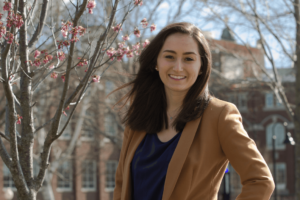
Ten students from Providence College applied to receive a Fulbright Scholarship this year. A candidate qualifies if he or she is an undergraduate senior or has graduated within five years at the time of application, and Jennifer Dorn ’18 was the only PC senior to receive this prestigious award in 2018. While Dorn stood outside of the John F. Kennedy Center for the Performing Arts this past weekend, she discussed how thrilled she is to be a Fulbright recipient. “It is going to be fun and gives me opportunities to be creative,” exclaimed Dorn.
As a theater arts and English double major from Dallas, Texas, Dorn has a passion for the performing arts and has participated in theater for 14 years. This past weekend, she attended the Institute for Theater Journalism and Advocacy, a workshop sponsored by the Kennedy Center American College Theater Festival. After qualifying for this workshop, Dorn had the opportunity to refine her skills in journalism, specifically theater criticism.
In addition to improving her analytical and writing skills, Dorn was fortunate enough to meet well-known theater professionals and critics, such as Sarah Kaufman, a dance critic for the Washington Post and the recipient of the 2010 Pulitzer Prize for Criticism.
According to Dr. Darra Mulderry, an associate professor of history at Providence College and the director of national and international fellowships for PC’s Center for Engaged Learning, the most difficult part of the application process is preparing a personal statement and a statement of purpose—each only one page long. “Jen was the first prospective applicant to approach me for this year’s scholarship,” noted Mulderry. “I wanted to do something different after graduation,” stated Dorn. She explained that she was looking for opportunities to teach and/or travel following her undergraduate years.
Dorn explained that after speaking with Dr. Mulderry, she went to an informational session on campus during the spring of her junior year. Beginning in the summer, she went onto the Fulbright’s scholarship site and searched through prospective countries. While working in the admissions office as a summer assistant Dorn began writing drafts of her statements.
“The process included a great deal of writing, revising, editing, and also making sure that each word would culturally translate,” noted Dorn. She was initially interested in diving deeper into an English Teaching Assistant (ETA) role in Latvia or Greece. However, the Czech Republic became a perfect fit because of her interest in the country’s cultural history. “I have always wanted to travel to the country because of the rich artistic and sociopolitical forces at play,” stated Dorn. She also revealed that the first president of the Czech Republic, Václav Havel, was a humanitarian deeply involved in the performing arts. She submitted her application last October, and received the scholarship on March 23.
Dorn explained that she will be assisting with English instruction for about 20 hours per week for 10 months in a track secondary school in Zábřeh, a town in the Olomouc region of the eastern portion of the country. “This opportunity will give me time to read, write, and do what I love,” exclaimed Dorn.
In addition to teaching English, she will also be a cultural ambassador for the United States in the Czech Republic. For the Fulbright Scholarship, the education level where students are placed depends solely on the country. “Jen was placed in a secondary education setting, because the country desired one at that level,” explained Mulderry. Coincidentally, the school where Dorn will be teaching English has a drama club. “I am playing around with the idea of pursuing a career in theater and arts education in the future,” acknowledged Dorn. She was also accepted to Teach For America this year, and will be an elementary instructor in Tulsa, Oklahoma, for two years beginning in 2019.
The scholarship offers fully funded living expenses for 10 months. Beyond this, Dorn will be a part of the Fulbright network, an extremely tight-knight community, for the rest of her life. The scholarship has been funded by United States State Department since 1946, and hopes to promote cultural awareness as well as build cultural bridges between countries.
Because the program requires learnedness and preparation for cultural ambassadorship, a bachelor’s degree is required for all applicants. Students interested in the Fulbright experience should contact Dr. Mulderry. Those who hope to become a Fulbright scholar immediately after graduation should start their applications early in the summer before the start of their senior year.
Bursting the PC Bubble: Zuckerberg on Trial
by The Cowl Editor on April 12, 2018
National and Global News
A News Brief on Regulating Social Media Platforms
by Ernie Andreoli ’18
News Staff
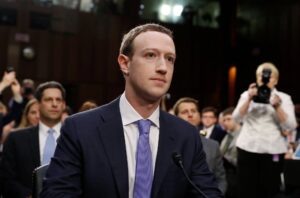
Roughly 87 million American Facebook users had their data gathered by Cambridge Analytica and a British-based data firm as a part of a political consulting work, which included President Donald Trump’s campaign operation. In light of the revelations first published by The New York Times and The Observer last month, several U.S. state attorney generals have begun investigations into Cambridge Analytica’s misuse of tens of millions of Facebook users’ personal data.
In addition, Facebook has suspended Cambridge Analytica from its site for violating its terms of service and Cambridge Analytica’s Board of Directors has suspended CEO Alexander Nix from the company. Multiple undercover reports stated that Nix instructed his inferiors to bribe politicians for partnership purposes, and the benefit of the company’s development of a database that captured psychological profiles of American voters.
According to several confidential reports, the political consulting firm attracted conservative campaign teams with avant-garde data collection tools that allowed them to compete with Democratic opponents in the 2016 presidential campaign. In an interview with The New York Times last month, Christopher Wylie, a whistleblower who helped found the political consulting firm and worked there until 2014, stated: “Rules do not matter for them. For them, this is a war and it is all fair.” In a February 2016 interview with NPR, Nix disclosed that the company worked with information technology researchers to develop a “120-question survey” with the intent to “probe personality” by presenting this survey to thousands of Americans. Nix acknowledged that the company asked a series of behavioral questions in order to create personality models for prospective voters.
Records investigated by the Times revealed that around 300,000 people took this survey. While the story continues to unfold day by day, what is known is the fact that Aleksandr Kogan, a researcher affiliated with Cambridge University, created an app that allowed access to users’ Facebook accounts. The data, which was intended for academic purposes, included details about users’ friends, education, location, occupation, relationship status, and pages liked.
On April 4, Facebook disclosed that Kogan’s data transaction to Cambridge Analytica included as many as 87 million users. However, at the time of the reported leak last month, Facebook projected that only roughly 50 million users could have been affected. While Nix and other spokespeople for the company denied receiving or using the Facebook data during a Parliament hearing in February, the Times obtained a statement from the company in March stating that the company did receive Kogan’s data, but deleted the compilation after realizing that the undertaking could lead to infringements on privacy laws, and the illegality of hiring foreign consultants in political campaigns.
In Dec. 2017, Special Counsel Robert Mueller requested that Cambridge Analytica turn over employees’ emails and other undisclosed documents as a part of an effort to investigate the Trump campaign’s data operation. While the special counsel’s strategy remains largely concealed to the public, anonymous sources revealed to the Times last month that Cambridge Analytica had previously held business ties with Russian and Ukrainian affiliates. In regards to how Facebook fares in this situation, the company acknowledged that it first knew about the data mishap in Dec. 2015, and only started notifying users whose data was compromised on April 9. On Tuesday, Mark Zuckerberg, Facebook’s founder, testified before a joint session of the Senate commerce and judiciary committees.
While Zuckerberg admitted personal responsibility for the company’s handling of user data and pledged to resolve the situation from ever occurring again, the hearing brought to light the issues facing social media platforms: the transparency of users’ consent with private social media platforms, and privacy.
“We are in an age where storing and processing data has never been cheaper,” noted Dr. Adam Villa, an associate professor of computer science at Providence College. Prior to this leak, Villa believed that information technology and social media companies could store data with a lack of concern for users’ information. Yet, it remains unknown at this moment what federal oversight could look like. While Zuckerberg hinted that the company could be open to a variation of the European Union’s Data Protection Directive, a statute that regulates the harvesting of personal data, Villa maintained that the majority of data processing covertly occurs behind the scenes. “Internet users must have the mentality that anything could be tracked, traced or used for some uncharted purpose.”
Dr. Matthew Guardino, an assistant professor of political science at Providence College, believes that Zuckerberg’s testimony will lead to more dialogue about the business models of social media networks on the internet, but that this conversation has been “far overdue” at the congressional level. Guardino insisted that Democrats and Republicans have been adverse to media regulation for various political purposes, but he noted that “public opinion on this issue will affect future regulatory outcomes.”
In regards to what type of restrictions would be constitutional to enact on social media companies, Guardino stated that because there have been different first amendment interpretations floating around in the courts, a straightforward regulatory plan of action is not set in stone. In addition to determining how to better protect users’ data, the hearing held powerful political implications. Guardino raised an important inquiry that remains dubious: “How comfortable are we with data being used to manipulate us and to hold certain opinions?” This question remains at the forefront of policymakers’ agendas in Britain and the United States.
Schneider Arena Sells Meat On Fridays of Lent
by The Cowl Editor on March 15, 2018
Campus
Hot Dogs Are Sold During Hockey Games
by Ernie Andreoli ’18
News Staff
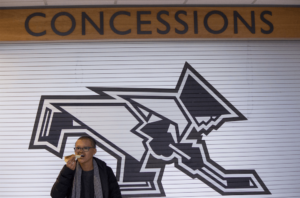
The Providence College Men’s Hockey Team defeated University of Massachusetts Lowell in style on Feb. 16. Yet the first hockey game at Schneider Arena during the Lenten season stirred up a quandary for the College’s administrators. Should the hockey rink be able to sell meat products during the Catholic religious observance? In accordance with the College’s Office of Mission and Ministry, on-campus food service vendors Raymond Dining Hall, Alumni Dining Hall, Dunkin’ Donuts, Starbucks, and Eaton Street Café are prohibited from serving meat products on Fridays during Lent. However, Schneider Arena has continued to sell meat products despite this Christian observance for at least seven years.
“If the food vendor in question was internal, there would be no meat served,” noted Fr. Gabriel Pivarnik, O.P., vice president for mission and ministry. According to Pivarnik, Schneider Arena’s concession options are not meant solely for the College’s student body, faculty, and staff. Rather, Fr. Pivarnik believed that because many of the attendants at hockey games are not Catholic, and due to the fact that the College’s hockey team often faces off against teams from non-Catholic institutions, it would be unnecessary to prohibit the selling of meat. After consulting Father Brian Shanley, O.P., the Office of Mission and Ministry concluded that Schneider Arena classified as an “outside vendor” for food services.
Since Fr. Pivarnik took on his position in 2013, he affirmed that no student has complained to the Office of Mission and Ministry about meat being sold in Schnieder. While Fr. Pivarnik acknowledged that a number of students may be vexed by the fact that the on-campus food service vendors abstain from serving meat on Fridays during Lent, he believes that the practice is ingrained within the College’s pursuit. When asked why the College does not serve meat to Catholics, and non-Catholics, whom do not desire to follow the act, Fr. Pivarnik declared “it is the principle.” For Fr. Pivarnik, when the College’s community refrains from eating meat on the designated days, it symbolizes a sense of solidarity with one another—especially the less fortunate. “For those who struggle to put food on their plates, sometimes they do not even have the option to consume meat,” he added.
Forgoing meat on Fridays during Lent is not solely a Dominican ritual but a Christian one. The observance is not only practiced in the Catholic Church but also in the Anglican, Eastern Orthodox, Oriental Orthodox, Lutheran, and Methodist Churches. Fr. Pivarnik explained that meat is seen as a luxury good in the Bible. Because of this, giving up meat translates into possessing a sense of solidarity with the poor. However, this component of fasting is only one-third of this mortification. Observers of Lent also adhere to additional almsgiving and prayer. By viewing the Lenten season through this lens, Fr. Pivarnik maintained that giving up meat “creates space for new practices in our lives.” Would administrators ever change their decision on allowing on-campus food vendors to serve meat to the College’s community members? Fr. Pivarnik insisted that if this declaration was ever presented to the Office of Mission and Ministry, “We would think long and hard before we changed it.”
In partnership with Providence College Dining Services, Sodexo has abided by the College’s food service guidelines during Lent. During the Lenten season, Stu Gerhardt, the general manager of the College’s Dining Services has ensured that there are a variety of options for students with different diets and allergies. “We do the best we can,” stated Gerhardt. After serving in this role for seven years, Gerhardt affirmed that those involved with the College’s Dining Services consistently strive for excellence. In regards to the question of whether the College’s administrators will ever decide to offer meat options during Lent for Catholics and non-Catholics, Gerhardt noted, “It is about the tradition, but students have a voice.”
Gerhardt insisted that if any student has a concern with the meal options offered at the on-campus food vendors during or outside of Lent, he or she should not hesitate to give feedback to the College’s Dining Services. Students are encouraged to visit the “Sodexo My Way” website, click on the menu on the upper dashboard of the site and send in their comments. The feedback goes directly to Gerhardt. Because he believes that “there needs to be a benefit for being on a meal plan,” Gerhardt hopes that more students will send in their comments or concerns via the above website. “Stu is very creative in offering the College’s community food options,” noted Fr. Pivarnik.
Bursting the PC Bubble: Stock Market Experiences Severe Dip
by The Cowl Editor on February 15, 2018
National and Global News
PC Economics Professor Analyzes the Effect of Stock Market Volatility
by Ernie Andreoli ’18
News Staff

The stock market experienced a severe dip on Monday, February 5 as the Dow Jones Industrial Average closed down 1,175 points, or 4.6 percent. A drop of this magnitude has not been recorded since the index dropped by 778 points in September 2008, in the course of the Great Recession. Specific macroeconomic factors precipitated the stock market’s oscillation. “This is a correction in the stock market,” noted Dr. Christopher Limnios, assistant professor of economics at Providence College. “As economists, we have to ask ourselves why this occurred,” added Limnios.
On Feb. 2, the Bureau of Labor Statistics reported that the United States’ economy added 200,000 jobs in January. According to the report, this addition marked the 88th consecutive month in which the economy added jobs to the market. Average hourly earnings rose to $26.74, with an annual growth of 2.9 percent—an upturn not seen since June 2009. In conjunction, the unemployment rate currently stands at 4.1 percent. Altogether, the growth in the labor market, and the previously steady bull market, prompted investors’ fears over the likelihood of further interest rate increases by the Federal Reserve, or “Fed,” as well as the prospect of higher inflation.
As reflected in the volatility in the Dow Jones index and the S&P 500, among other equity indices, the drop off was attributed to investors’ panic that a loss in real value of the dollar could lead to additional interest rate increases by the Fed. “We have had prolonged low interest rates since 2009, so many investors reacted to the prospect of higher inflation by hastily betting on what the Fed will do,” stated Limnios. As a side note, analysts have examined trends in the Fed Funds futures market, and projected three interest rate increases for this year. Yet since the recession, inflation in the United States’ economy has not deviated from its 1 to 2 percent level. “While we do not have a sure handle on inflation, many investors reacted to the signal of labor market inflation last week,” declared Limnios.
In addition to the perils of rising inflation, the Federal Reserve’s interest rate strategy moving forward will also take into account the recent $1.5 trillion tax cut passed on Dec. 20, as well as the passage of a two-year spending deal for the federal government approved by President Trump on Feb. 9. Also, on Feb. 14, the Bureau of Labor Statistics released a monthly report revealing that prices rose, across sectors, more than expected in January. This surprising jump in prices was reflected in a 0.3 percent increase in the Consumer Price Index, excluding food and energy, two uniquely volatile categories typically omitted in order to better determine the inflation trend. This revelation will play a key role in stock market volatility over the coming weeks.
So, how does this turbulence affect people’s daily spending habits? According to Edward Wolff, an economist at New York University, 84 percent of all stocks are held by the richest 10 percent of Americans. In contrast in 2001, “the richest 10 percent owned only 77 percent of all stocks,” noted Wolff in an interview with NPR on Feb. 12. Despite this concentration, consumer spending, particularly on durable goods such as appliances, houses, and cars, is impacted. This “psychological effect from a decline in markets,” according to Limnios, could prompt a recoil in consumer spending. While the United States’ GNP diminished a great deal during the Great Recession, there has been tremendous recovery in a variety of sectors since then. Prior to the stock market’s descent last week, the Dow Jones yielded a 25 percent return over the last year. For the most part, the stock market is essentially back to where it stood in December 2017. “These are growing pains,” acknowledged Limnios. “We are going to see further growth in output, but people jumping the gun on the Fed’s decisions will lead to dips in the stock market.”
Bursting the PC Bubble: What’s Going on in the White House
by The Cowl Editor on February 1, 2018
National and Global News
Trump Reveals Desire to Fire Special Councilman Mueller
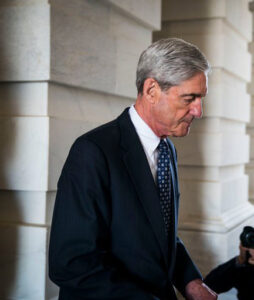
by Ernie Andreoli ’18
News Staff
President Donald Trump reportedly ordered the firing of Robert S. Mueller III, the special counsel for the department of justice who is administering the investigation into Russian interference in the 2016 presidential election, last June, according to four individuals familiar with the matter. However, President Trump revoked his decision after White House counsel, Donald F. McGahn II, refused to ask the Justice Department to dismiss Mueller, and threatened to resign.
On Jan. 25, The New York Times published an exclusive article which revealed that President Trump tried to fire the special counsel amid a potential obstruction of justice case. According to the Times’ sources, Mueller became aware of this confrontation after investigators assigned to the Russia probe questioned current and former senior White House officials. Beginning in mid-June, the special counsel widened the investigation to determine whether or not President Trump attempted to obstruct justice by interfering with the judicial system. Prior to this development, the special counsel’s investigation focused primarily on whether the Trump campaign collaborated with the Kremlin.
According to the Times, the president insisted that Mueller had to be dismissed due to three conflicts of interest. First, Trump argued that Mueller, who was a member of his golf course in Sterling, Virginia, and the FBI Director at the time, revoked his membership following a dispute over club fees. Second, the president claimed that Mueller could not be fair because he previously served as a partner at WilmerHale, a law firm that used to represent Jared Kushner, the president’s son-in-law. Third, the president argued that Mueller was interviewed to return to the FBI just days before he was assigned to oversee the Russia investigation. According to the Times’ anonymous sources, McGahn, after becoming aware of the president’s intention, believed that firing Mueller would undoubtedly be interpreted by investigators as a tactic to obstruct the Russia investigation. According to these revelations, Mr. Trump pulled back after McGahn said he would quit.
As the top lawyer for the Trump campaign, McGahn has worked hand in hand with the president on strategic, administrative, and political decisions, such as the firing of James Comey, the director of the FBI, on May 9. “When you are dealing with an obstruction of justice case,” stated Dr. Paul Herron, a political science professor at Providence College, “the issue is intent.” Herron acknowledged that while President Trump had the legal authority to fire Comey, the question at stake is whether or not he dismissed him in order to impede the Russia investigation.
Herron noted that in the obstruction of justice cases with President Bill Clinton and President Richard Nixon, clandestine documents were destroyed and witnesses were told to lie under oath. While it remains unknown by the public whether or not the Trump administration performed either one of these schemes, “President Trump is afraid of something,” stated Herron.
When reporters asked President Trump to comment on these disclosures while attending the World Economic Forum in Davos, Switzerland, the president called the Times’ revelations “fake news.” The president added that the exclusive was “a typical New York Times fake story.” After Ty Cobb, a well-known trial lawyer in Washington D.C., joined the Trump administration’s legal team in July, the president has retreated from criticizing Mueller’s impartiality. According to the Times’ sources, Cobb’s arrival has led to a turning point in strategy—cooperation, not antagonism.
Over the last two weeks, the president’s attorneys have acknowledged that they are currently deliberating with the special counsel’s office to work out an in-person interview with President Trump. There has been no confirmation as to when this inquiry will take place. “We are heading into a political crisis situation,” asserted Herron. By undermining a federal institution like the FBI and validating conspiracy theories such as the belief that the special counsel’s probe is a Democratic-led attempt to sabotage the Trump administration, President Trump’s endeavors “seem a lot like obstruction of justice,” concluded Herron.
Dr. Bernice A. King Addresses PC Community for Rev. Dr. Martin Luther King, Jr. Convocation
by The Cowl Editor on January 19, 2018
Campus
King Discusses Nonviolent Protest and Creating the “Beloved Community”
by Ernie Andreoli ’18
News Staff
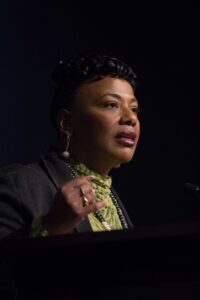
Dr. Bernice A. King, a distinguished minister and the youngest daughter of the late Rev. Dr. Martin Luther King, Jr. and Coretta Scott King, presented the keynote address at the inaugural Rev. Dr. Martin Luther King, Jr. Convocation at Providence College on Thursday, January 18. Over 600 students, faculty, and members of the Providence community packed into the Peterson Recreation Center to hear Dr. King’s lecture on her father’s legacy, as well as the importance of sustained civil rights activism.
In commemoration of the 50th anniversary of her father’s assassination, King stressed that “together we win with love for humanity.” After an introduction by Dr. Hugh F. Lena, provost and senior vice president for academic affairs, Father Brian Shanley, O.P., greeted the crowd by touching upon the late Dr. King’s vision of the “beloved community.” Fr. Shanley reiterated that an interconnected community and a “just social order” could only be accomplished through “faith, hope, and love.” As a part of the MLK Convocation week on campus, Fr. Shanley honored Dr. Francis P. MacKay, Dr. René E. Fortin (posthumous), Dr. Mark N. Rerick (posthumous), and Rev. Robert A. Morris, O.P. (posthumous) for creating the Rev. Dr. Martin Luther King, Jr. Scholarship at Providence College.
Fifty years ago, Rev. Morris, a champion of diversity and inclusion, encouraged the College’s administrators to create a scholarship for incoming students that commemorated the civil rights achievements of the late Rev. Dr. King Jr. During the fall semester of 1968, a cohort of students received this notable award. Today, 100 students have received this scholarship from the inspiring works of these four honorees and their commitment to equality, diversity, and inclusion.
Following the inaugural presentation of the MLK Vision Award, Ralph E. Tavares, director of multicultural student success and assistant dean of undergraduate studies, spoke of the continuous importance of selflessness, dedication, and love throughout our lives and communities. While Tavares acknowledged that polarized political ideologies and instances of hatred have divided the College’s community to a certain extent, he asserted that “love will keep us planted.”
Following Tavares’s remarks, Phionna-Cayola Claude ’18, president of Student Congress, emphasized the “power of conversation” to combat bigotry. Claude contended that while all individuals hold different beliefs, equality and justice are essential for communal development and self-actualization. Prior to introducing Dr. King as the keynote speaker, Claude stated that Dr. King is the living example of her father’s purpose.
In commemoration of her father’s life, Dr. King encouraged all in attendance to perform 50 acts of kindness and service to individuals of another race between now and April 4, the day her father was assassinated in Memphis, in an effort to mitigate the current racial climate. Furthermore, Dr. King invited all attendees to take part in the March for Humanity in Atlanta on April 9 in an attempt to connect with one another, impede racial discrimination, and enact positive change in people and institutions.
According to Dr. King, nonviolent resistance, a practice her father tirelessly encouraged, is the most necessary tactic to be used in social movements, as well as throughout our lives. Specifically, in a time of technological connectedness and social unrest, Dr. King proclaimed that “when it comes to humanity, we cannot have losers.” Ultimately, in order to “create a beloved community,” Dr. King exclaimed that nonviolent resistance will lead to our spiritual and moral development.
Dr. King examined her father’s studies in theology and civil activism, and how these teachings fare in 2018. As her father declared in the mid-1950s, she reiterated that the Montgomery Bus Boycott “was not a victory over white people.” Rather, Dr. King emphasized that the political and social protest was a “victory over injustice.” In order to expose the ugliness of violence and injustice in this day and age, Dr. King encouraged all in attendance to face prejudice through love.
Following Dr. King’s address, Tavares moderated a Q&A session between Dr. King and those in attendance. Adriel Antoine ’18, president of PC’s chapter of the NAACP, asked Dr. King for her thoughts on how to keep the momentum going with current social and political resistance movements. “People are responding, but they are not organizing,” stated Dr. King. While she acknowledged that protests are an important component of nonviolent resistance, Dr. King insisted that “the goal is change.”
Dr. King encouraged all in attendance to make justice, freedom, and righteousness a reality. In January 2012, Dr. King was appointed chief executive officer of The King Center, a nonprofit organization founded by Coretta Scott King in 1968. Located in Atlanta, Georgia, this resource institution is committed to nonviolent social change in honor of the late Rev. Dr. King Jr., Mahatma Gandhi, and Rosa Parks, among other influential social activists. Dr. King graduated from Spelman College with a B.A. in psychology in 1985 and obtained her J.D. and Master of Divinity from Emory University in 1990. Reflecting on the convocation, Jayson Sanderson ‘21 noted “It was breathtaking.” Sanderson went on to state that Dr. King’s lecture provided “a lot of encouragement to people of color, as well as the entire PC Community.”
PC Democrats Host Gun Law Trivia
by The Cowl Editor on December 7, 2017
Campus
Students Were Invited to Test Their Gun Law Knowledge
by Ernie Andreoli ’18
News Staff

The Providence College Democrats hosted a Gun Law Trivia event open to the Friar community in the Ruane Center for the Humanities on Nov. 29. As students piled into the second floor classroom, competition was in the air. After Amy Gilligan ’18, vice president of the PC Democrats, ushered in pizza and refreshments, the 30 students were tasked to sign into Kahoot!, an online trivia platform, and put on their thinking caps.
The trivia game consisted of 20 questions regarding current facts and figures on gun ownership in the United States. While the game was an emotional rollercoaster at times, students performed well. “I cannot believe I am still in first,” exclaimed Meghan Letendre ’19, after she correctly answered the percentage of citizens who owned a gun in rural, suburban, and urban America. Following the game, Gilligan awarded the top three participants with the highest scores gift cards to Dunkin’ Donuts, LaSalle Bakery, and Chipotle.
“This was both fun and informative,” noted Kristen Rezuke ’18, the third place recipient. As final exams near, the PC Democrats are looking forward to holding more events like this next semester. “Our focus in meetings is to build a community with one another,” stated Gilligan. By presenting students with facts, such as Vermont is the only state to allow individuals to carry a concealed gun without a permit, the PC Democrats encourage students to form their own opinions on various current issues.
Matt Skowronek ’20, treasurer of the club, appreciated the fact that an intellectually diverse group of students participated in the trivia event. Participants included members of a number of campus organizations, such as SHEPARD, Student Congress, and Science Fiction Club, as well as students in Dr. Charlotte O’Kelly’s sociology course, “The Power of Whiteness.”
“Trivia is fun and competitive, and it is also a way to communicate important facts across ideological spectrums,” noted Skowronek. Hannah Bone ’20, the public relations officer for the PC Democrats, echoed her fellow executive board members’ appreciation of the success of the trivia game, and commented on the trajectory of the club’s mission. “Tonight’s trivia game was a great example of our goal to continue to grow as a club, and attract more members of the PC community through informative events,” noted Bone.
On behalf of the club’s executive board, Bone explained that the PC Democrats are primarily interested in encouraging students to have a clear understanding of current events during this political climate, and be comfortable expressing their views among peers. While Rory O’Brien ’19, secretary of the PC Democrats, is looking forward to studying abroad next semester, he, like his fellow officers, is excited to see how the club grows over the coming years. According to O’Brien, the PC Democrats have attracted a number of new members this semester, especially freshmen, because of the club’s educative meetings and didactic events.
This semester alone, the PC Democrats hosted a lecture by Dr. Adam Myers, assistant professor of political science, on the current political contentions over immigrations laws, as a well as a lecture by Dr. Abigail Brooks, assistant professor of sociology and the director of the women’s studies program, on women in politics. Because the club’s members have placed an emphasis on hosting lecturers, and creating an informal environment for students to learn and discuss political matters, O’Brien believes that student involvement is of utmost importance.
While the club focuses on addressing current political issues, it is not tailored toward political science students. “I am an English major, but I have a passion for learning about political niceties,” stated O’Brien.
Business School Hosts Investment Forecast Forum
by The Cowl Editor on November 16, 2017
Campus
CEOs Discuss Socially Responsible Investing
by Ernie Andreoli ’18
News Staff
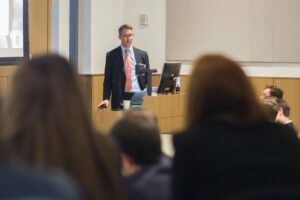
The Providence College School of Business hosted an Investment Forecast Forum in the Ryan Center for Business Studies on Nov. 9. Students, faculty, and alumni came together for a discussion on investment forecasting for the upcoming year, with an emphasis on socially responsible investing.
The event included a keynote presentation by Douglas Heske ’84, CEO of Newday, and Kurt Lieberman, CEO and chief research officer of Magni Global Asset Management LLC. After Dr. Sylvia Maxfield’s warm introduction to the packed audience in the KPMG Auditorium, Brian Kozak ‘18, vice president of the Providence College Finance Society, introduced Heske and Lieberman.
Heske began the presentation with a vignette on Pacific Electric & Gas Company’s (PE&G) role in insinuating California’s fire-ravaged wine country destruction in last month. On Oct. 18, Robins Cloud LLP filed a lawsuit against PE&G alleging that the company was responsible for much of the wild fire destruction inflicted on many homeowners in San Francisco County.
Heske reiterated the lawsuit brought to the San Francisco County Superior Court by stating that PE&G knew that drought-like conditions existed, and negligently failed to properly maintain its power lines and electric equipment. As a result, PE&G jeopardized its financial health, as well as its shareholders’ return. Heske highlighted that PE&G is a prime example of a publicly traded company that failed to regulate its governance practice.
As CEO of an investment management firm that focuses on improving companies’ investments in Environmental Social Governance (ESG), Heske indicated the importance of investing in environmentally sustainable assets. “Tomorrow is worth the investment,” stated Heske. Newday partners with corporations across the nation to implement positive social governance change with data analytic tools, and the integration of ESG investments.
Heske explained that his sustainable investment management firm “hopes to serve the common good, and support companies that are stewards of scarce environmental resources.” After discussing the environmental and social challenges facing society in this day and age, Heske indicated that all companies must seek to create shareholder wealth while mitigating risk, improving the community, and discarding “contingent liabilities” in an effort to improve Earth’s environmental sustainability.
In order for investment management firms to provide sustainable investment advice to its clients, data analytic providers, such as Magini Global, are a necessity. Lieberman emphasized the importance of governance researchers, and data analysts, to interpret ESG data and measure the sustainable and ethical impact of a company’s investment. While standard algorithmic models have yet to be developed for ESG investments, Lieberman noted the importance of measuring the impact of an investment, assessing the behavior of the parties involved, and building a process that will provide investment managers with a framework for giving sustainable investment advice to companies.
To conclude, Heske and Lieberman emphasized that growth in ESG investments is on the rise, and it is imperative to combat the social and environmental challenges of today. Following the discussion, Nick Coassin ’18, president of the Providence College Finance Society, piloted a student-led dialogue that sought sustainable investment insight from Heske, Lieberman, and two other PC alumni involved in ESG investment management.
In response to Coassin’s questions regarding how the current political climate has impacted sustainable investment initiatives, Heske emphasized that a rise in carbon emissions and population growth will not go away. Ultimately, a focus on ESG investments will grow companies’ value, and ameliorate the unyielding environmental and social challenges.
Bursting the PC Bubble: Catalonia
by The Cowl Editor on November 2, 2017
National and Global News

By Ernie Andreoli ’18
News Staff
On Friday, October 27, the Catalan Parliament voted to declare independence from Spain. This unprecedented vote came almost a month after Catalonia’s lawmakers held a referendum for independence despite the Spanish government’s dissent.
Following the regional parliament’s vote, legislators in Madrid authorized Prime Minister Mariano Rajoy to dissolve the previously semi-autonomous region’s government in an effort to prevent Catalonia’s secession from Spain.
Minutes after the Catalan Parliament’s vote for independence, Spain’s Senate granted Rajoy the power to remove the region’s president, and hold new elections on Dec. 12. In a fervent speech delivered to senate members on Friday, Rajoy insisted that Catalonia’s intention to secede is “a clear violation of the laws, of democracy, of the rights of all, and that has consequences.”
In the 135-member Catalan Parliament, secessionists have a slight majority, but 70 votes were cast in favor of independence, with ten against, and two blank ballots.
While a number of pro-unity parliamentarians left the vote out of protest, this historic vote encapsulated a number of Catalans’ desire to separate from Spain. Thousands of people supporting independence gathered to watch the vote outside the Catalan parliament building in Barcelona while waving flags, embracing one another, and chanting “freedom.”
After Spain’s senate invoked a constitutional move to abrogate Catalonia’s autonomy, Rajoy’s cabinet is now in the process of drafting a plan to take power in Catalonia, and dismiss Catalan President Carles Puigdemont. Yet there is a great deal of uncertainty as to how these political maneuvers will fare against the Catalan people.
For a number of Providence College students studying abroad in Spain, Catalonia’s vie for independence has had a significant impact on their abroad experiences. According to Mikayla Williams ’19, who is currently studying in Barcelona, the Catalan pride in Barcelona has been ever-present through propaganda and protests.
Williams recounted that a number of Barcelona residents clanged on pots and pans outside their homes in an effort to showcase their support for Catalonia’s independence from Spain. “It is amazing to witness a community protest for what they want, in their eyes—democracy,” noted Williams. While support for independence has grown since Puigdemont officially supported Catalonia’s independence referendum on Oct. 1, a number of people in Madrid have been shocked by many Catalans’ desire to secede from Spain. According to Williams, in an effort to show support for unification and the country’s security, thousands of people gathered in the streets of Madrid chanting “viva la policia” following the Catalan parliament’s referendum.
While Rajoy and his cabinet are expected to take power in Catalonia through direct supervision of the Catalan police force, questions remain as to how this strategic move will fare with the people of Catalonia.
Because Catalonia is one of Spain’s most culturally and economically affluent regions, the region’s secession could undermine Spain’s social and economic development, as well as create a vulnerable autonomous government for Catalonia.
While Spain’s senate has authorized Rajoy and his cabinet members to exert control over the previously semi-autonomous region, uncertainties remain as to how Catalan secessionists will react to a political restructuring of the region.
Health Center Sponsors Flu Shot Clinic
by The Cowl Editor on October 20, 2017
Campus
by Ernie Andreoli ’18
News Staff
 On Oct. 12, Providence College held a flu shot clinic in ’64 Hall. Catherine Kelleher, R.N., director of student health services, greeted students inside the doors at one of the registration tables.
On Oct. 12, Providence College held a flu shot clinic in ’64 Hall. Catherine Kelleher, R.N., director of student health services, greeted students inside the doors at one of the registration tables.
Upon entrance, students were asked to provide their insurance card, as well as to fill out a seasonal influenza consent form. “Be proactive, get the flu shot, and have a healthy winter,” said Kelleher.
While Student Health Services provides such an opportune service to students, traditionally, attendance has been low. According to Kelleher, Student Health Services typically administers 300 vaccinations per season. However, during the peak of flu season, the Health Center sees a number of students with influenza symptoms.
“Most patients are ill for seven to ten days, sleep deprived, unable to attend classes, and many leave campus due to their illness,” Kelleher stated. However, Student Health Services hopes to see a jump in those who receive a flu shot due to a greater emphasis on advertisement.
The Providence College Parent Program sent an e-mail to the parents of each class in late September, and the flu shot clinics have been advertised through Providence College’s “Morning Mail” service.
“It was convenient and quick, and I am glad that the college is able to provide this service,” noted Erin Walsh ’20. “It is free, so I have no complaints,” stated Michael Fozz ’19.
Fozz went on to say that he was thankful that Student Health Services provided this service, and that the “student body can take advantage of this preventive care offered on campus.”
Getting a flu shot can reduce flu illnesses, health services visits, missed classes and schoolwork, and may prevent flu related complications and hospitalizations. Signs and symptoms of influenza include: fever, nasal congestion, cough, sore throat, body aches, and headaches.
Though rumors regarding the severity of the coming flu season are swirling, the Center for Disease Control explains that this gossip is unfounded. Since 2010, the CDC estimates 9.2 million and 36.5 million illnesses per year in the U.S.
According to Kelleher, “The first step to prevent the flu is to get a flu shot.” The CDC and Prevention also recommends preventative actions, such as staying away from people who are sick, good personal hygiene, covering coughs and sneezes, frequent handwashing, and adequate sleep.
“The more faculty, staff, and students who get vaccinated, the more people will be protected from the flu,” noted Kelleher. Student Health Services will hold two more flu vaccination clinic in ’64 Hall on Thursday, October 26, from 10 a.m. to 1 p.m., and Wednesday, November 8, from 5 p.m. to 8 p.m. Students are encouraged to contact Student Health Services at 401-865-2422 with any flu related questions, or visit the Rhode Island Department of Health’s website for helpful information.
